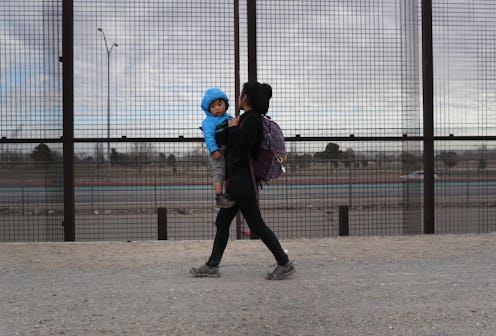
President Donald Trump has repeatedly claimed that shifting crime rates in El Paso, a Texas town with a border wall, illustrate why constructing a border barrier is a good idea. However, crime rates in El Paso before and after the border barrier don't necessarily reflect what Trump has suggested. Notably, crime rates in El Paso were steadily decreasing long before the border wall was constructed, NBC reported.
During his State of the Union address on Feb. 5, Trump characterized El Paso as a formerly highly dangerous city that became much safer after its border wall was built. "The border city of El Paso, Texas, used to have extremely high rates of violent crime — one of the highest in the country, and considered one of our nation's most dangerous cities," Trump said during his speech (via Vox). “Now, with a powerful barrier in place, El Paso is one of our safest cities." The Washington Post noted that Trump reiterated these claims about El Paso's safety during a campaign rally in the city on Monday evening.
However, these claims don't align with reality. NBC indicated that El Paso's border barrier was constructed between 2008 and 2009. The outlet noted that, according to FBI data, the city's crime rate was at a modern all-time high back in 1993, but then dramatically decreased for many years prior to the wall's erection.
Moreover, the EL Paso Times reported that violent crime actually increased in El Paso in the period during and several years after the wall's construction. The outlet also noted that, broadly speaking, El Paso is generally considered one of the safest large cities in the United States, with FBI data revealing that it has frequently had one of the lowest crime rates among cities with populations over 500,000.
EL Paso officials stressed to the Washington Post that El Paso's low crime rate was not solely perpetuated by the wall's construction, but instead reflected national trends in which violent crime in cities decreased significantly after the early 1990s. "Even if you give president the benefit of the doubt, the fence that was built in 2008 has made really no difference one way or the other," El Paso District Attorney Jaime Esparza told the paper.
El Paso's mayor, Dee Margo, also disputed Trump's claims about the wall's impact on criminal activity on Twitter. On Feb. 6, the mayor wrote:
El Paso was NEVER one of the MOST dangerous cities in the US. We‘ve had a fence for 10 years and it has impacted illegal immigration and curbed criminal activity. It is NOT the sole deterrent ...
NBC reported noted that, on Feb. 6, reporters asked the White House about why the president's claims about El Paso's crime rate don't seem to reflect reality. In response, White House director for Strategic Communications, Mercedes Schlapp, said that the high crime rate in Jaurez, Mexico — which lies across the border from El Paso — illustrates that the border wall is effective at reducing the Texas city's criminal activity. As Schlapp put it (via NBC):
Well, just so you know, in Juarez, which is across the border in Mexico, the murder rate has gone up significantly. So the mere fact that you do have a physical barrier at that place as we [do], that does work and helps keep the crime out of El Paso ...
It's clear that the president's comments about the border wall and crime rate in El Paso haven't sat well with many local officials. Indeed, five city officials signed a resolution on Monday condemning the president's remarks, the Washington Post noted.